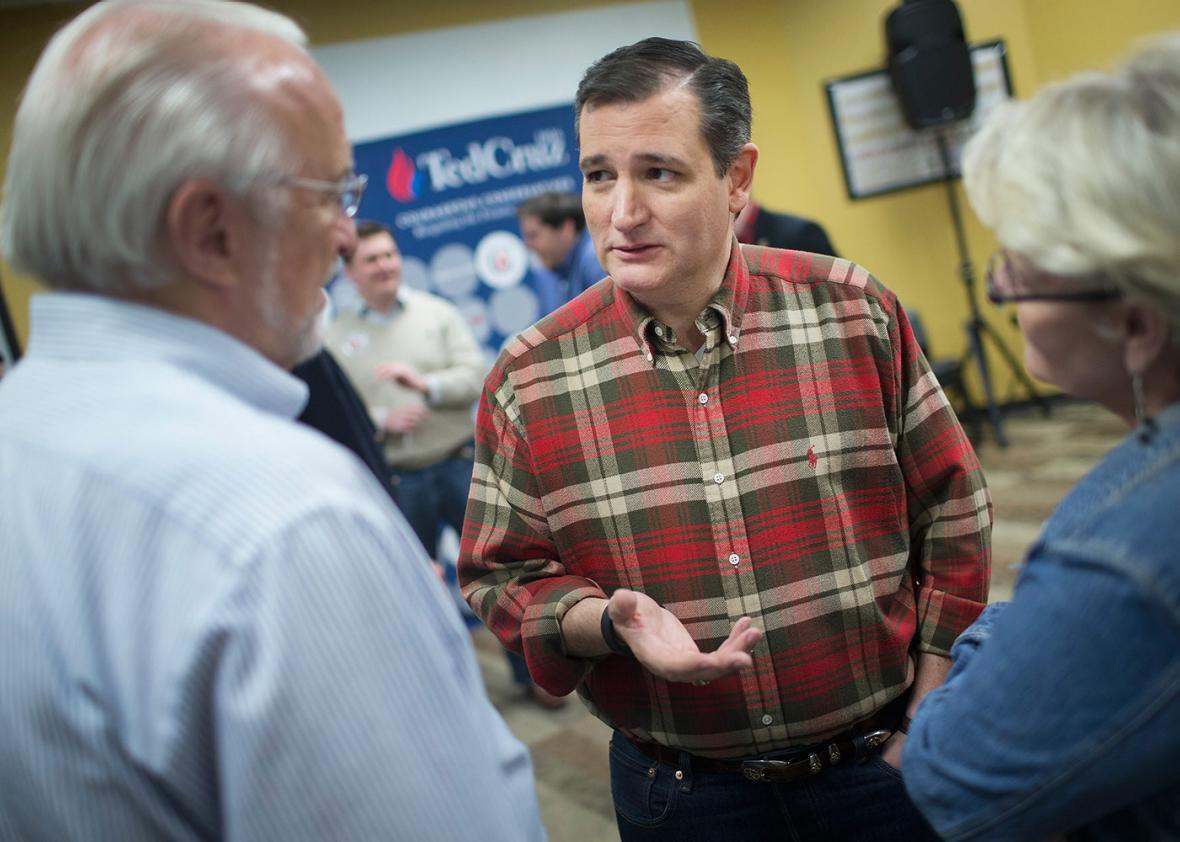When Sen. Ted Cruz is unplugged from the stump—when he’s talking to the donor class, not the working one—he sounds a lot more like his pedigree. Or at least that’s what’s on the grapevine. “Our little bird says that when addressing Manhattan donors, Cruz strikes a more moderate and inclusive tone on social issues than he does when speaking to Iowa audiences. Some donors say that New York Cruz sounds different than Iowa Cruz,” writes Mike Allen for Politico.
If true, this is obviously a problem for the Texas senator—a GOP analogue to Barack Obama’s infamous moment in the 2008 primary, recorded during an ostensibly private fundraiser in San Francisco, when he told listeners how, when “you go into some of these small towns, and … the jobs have been gone now for 25 years … it’s not surprising [working-class voters] get bitter; they cling to guns or religion or antipathy to people who aren’t like them … as a way to explain their frustrations.”
We can talk about Cruz’s approach to Big Apple GOP donors as a gaffe, but it’s more interesting to look at it as a symbol of his unusual and dynamic place in the Republican presidential primary.
Cruz is a smart and talented operator. Of the candidates in the race, he has the best, most organized campaign. He, more than anyone else, matches big donations to massive grassroots fundraising. And he, echoing Obama’s insurgent campaign for president, has dedicated his time to cultivating volunteers and local powerbrokers: the kinds of people who can deliver votes when it’s time to go to the voting booth.
At the same time, Cruz has always had a fatal flaw. Most politicians are opportunists in one way or another (see: Obama, same-sex marriage), but they can hide it. Cruz can’t. His ambition is naked and unvarnished, and it comes through in everything from his theatrical “filibuster” to his attacks on his Republican Senate colleagues. It’s why, even with standard positions for a GOP politician, Cruz was disliked and distrusted by mainstream Republicans.
Then came Donald Trump, who promptly dominated the primary with a campaign of nativist anger and contempt for elites. Trump has defined the contest, and still does, with a commanding national lead over his opponents and strong leads in two of the three early states. At least one elite option, Jeb Bush, has failed to overcome Trump, and the other—Sen. Marco Rubio—is failing. The only person to come close is Cruz.
When Trump entered the race, the early read was that he would supercede the Texas senator, who was trying to unify downscale and socially conservative Republicans. But the reality is that Cruz, more than anyone else, understood Trump’s appeal. Instead of attacking him, he stayed in his slipstream, waiting for Trump (and Ben Carson) to stumble, so he can claim their voters.
In the case of Carson, it’s working. But something else has happened, too. In the course of running as a respectable Trump, Cruz has become far more palatable to Republican elites. With Cruz in second place, they’ve taken another look and see an Ivy-educated former Bush official who straddles the establishment and the base with orthodox positions on taxes and spending and grassroots beliefs on abortion, same-sex marriage, and immigration. Not only can he contain Trump, but he’s also predictable.
And Cruz himself is comfortable on all sides. He knows when to sound a populist note, and he knows when to dial back. He’s connected to the conservative establishment—with support from right-wing pillars like the Heritage Foundation—and is tied to the traditional one, too. No, Republican elites may never like Cruz, but if it comes to Cruz versus Trump, they can live with the firebrand at the head of the ticket.
For Tuesday night’s debate, then, the task for Cruz is simple: Show the audience—and the Republican Party writ large—that he’s the only real choice. The only candidate who can handle Trump and carry the GOP standard without fracturing the party.
If there’s a question, it comes back to everything that held Cruz back before Trump emerged. Cruz is on the far right of the GOP, and his support rests on the most conservative voters in the party. This isn’t just a challenge in an eventual general election; it’s a challenge in the primary, too. There are still moderate Republicans, and they aren’t interested in bomb-throwers and ideologues. Can Cruz, with his right-wing affect, appeal to them too? Or is that an unprotected flank, open to attack from a equally skilled competitor, such as Rubio?
And more broadly, what happens to a Republican Party that embraces Cruz? Some elites say that he could save the GOP from Trump’s “existential threat.” But in the same way that Trump has made Cruz acceptable to GOP elites, Cruz has brought Trumpism to the mainstream. Cruz might be the only one who could stop Trump, but that’s just another way to say that—like Richard Nixon and George Wallace—Cruz may be the only one who can co-opt him.
